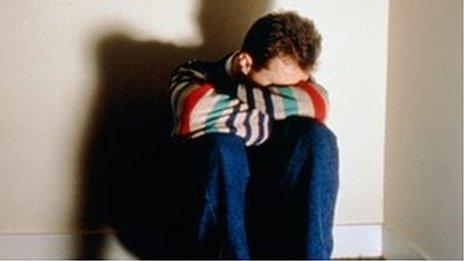Suicide: Northern Ireland has UK's highest rate for second year in a row
- Published
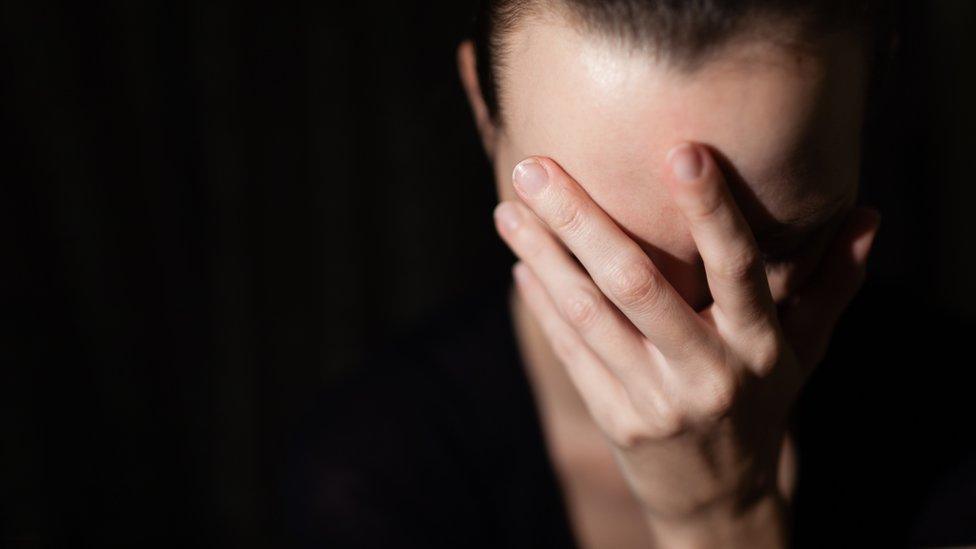
Northern Ireland has recorded the UK's highest suicide rate for the third consecutive year but the number of people who took their lives has fallen
Northern Ireland continues to have the highest rate of suicide in the UK, per head of population, according to the Office for National Statistics (ONS).
The latest available figures show that during 2014 there were 16.5 suicides per 100,000 in Northern Ireland.
Scotland had the second highest rate, at 14.5, followed by 10.3 in England and 9.2 in Wales.
It is the second consecutive year that Northern Ireland has recorded the UK's highest suicide rate.
Troubles legacy
However, the overall number of suicides in Northern Ireland decreased in 2014, falling to 268 compared to 303 deaths.
This reflected a small decrease in the total number of suicides across the UK as a whole in 2014, where the overall figure fell by 2%.
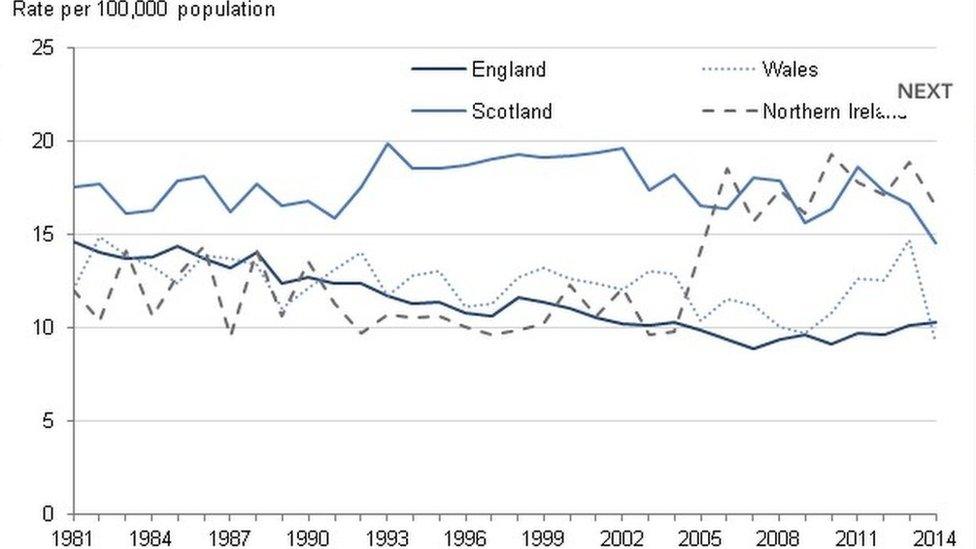
Suicide rate by country, showing deaths registered between 1981 and 2014
Last month, the Irish News reported that since the Good Friday Agreement was signed in 1998, more people have taken their own lives in Northern Ireland than were killed during the Troubles.
Prof Siobhan O'Neill, from Ulster University' Psychology Research Institute, told the BBC there may be a link between those decades of conflict and the deaths of some of those who have taken their lives in a time of relative peace.
"Deprivation certainly is one of the legacy issues and we know that those areas that are deprived, that have high levels of deprivation, have also been the same areas that were exposed to conflict.
"Those are the areas where our suicide rates are highest," she added.
'More resilient'
That link between deprivation and despair means that the legacy of the Troubles is having an impact on another generation in places like Londonderry.
Emma Johnston works with the charity Youth Action Northern Ireland which tries to get young people to talk about their mental health. One of the locations where she tries to help them is the job centre.
"Every programme that we deliver, at its core, at its very essence, is focusing around young people's mental health and while we may not frame it to begin with in that way, it's about raising them up, making them more resilient and maybe trying to raise their optimism for their future," she said.
One young woman who attends a support group in Londonderry told the BBC she had attempted suicide 16 times before getting help.
"It's only now in the past couple of months that I've been really coming out and been able to talk about it," she said.
Another said the intervention of a concerned friend forced her to address her mental health problems.
"When I was going through depression it took one of my friends nearly breaking into my house to find me. Eventually then I realised that other people are there to support," she said.
'Significant contribution'
A spokeswoman for Northern Ireland's Department of Health, Social Services and Public Safety (DHSSPS) said reducing the suicide rate "continues to be a priority".
"Over £7m is allocated annually to suicide prevention in Northern Ireland by DHSSPS," she said.
"This is more per head of population than any other UK country and does not take into account the significant contribution from the charities and the community sector, mental health services, and from other Northern Ireland departments."
Meanwhile, a new sports-based charity, founded by former Manchester United player and Northern Ireland international Pat McGibbon, is aiming to promote positive mental health in deprived areas before suicidal thoughts take hold.
Mr McGibbon, from Lurgan, County Armagh, had the world at his feet as an 18-year-old when he was signed by Manchester United in 1992.
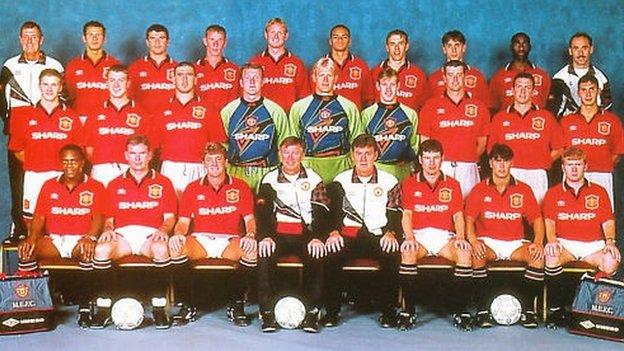
Pat McGibbon pictured with the 1995/96 Manchester United team, standing between David Beckham and Eric Cantona, with Ryan Giggs and Roy Keane just behind him
His teammates included David Beckham, Paul Scholes, and Roy Keane.
But just months after moving to England, he lost his brother Philip to suicide.
'Unanswered questions'
He had always been very close to his brother, and describes his suicide as a very personal and emotive subject.
But he added that his memories of Philip were "always positive" and the experience of loss helped to put things "into perspective" throughout his life, including the highs and lows of his 11-year football career.
The former player said that for those bereaved by suicide, many "questions go unanswered", especially if their loved ones did not talk about their problems.
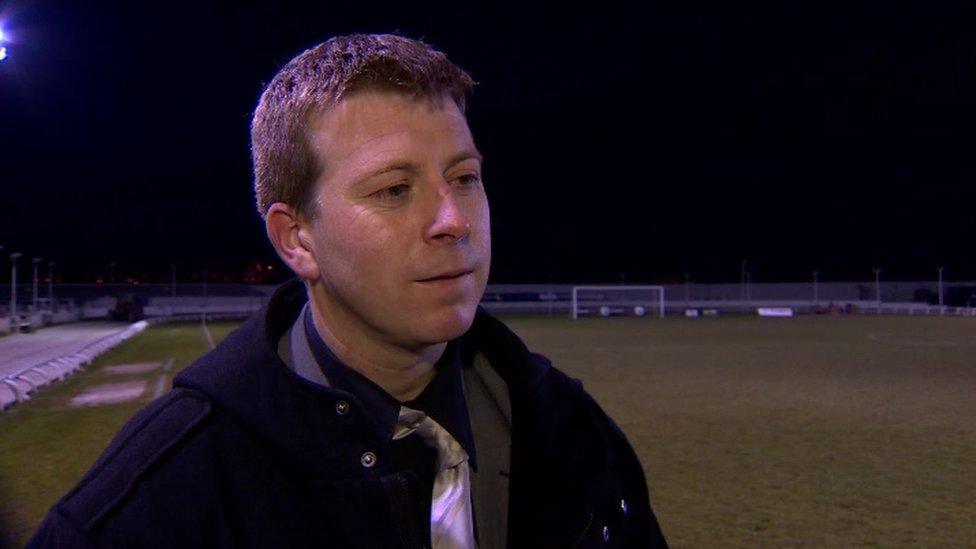
Former Manchester United player and Northern Ireland international Pat McGibbon has founded a sports-based charity to promote positive mental health
In 2013, he set up the Train to be Smart (TTBS) charity, which runs football training sessions in some of the most deprived wards in County Armagh.
'Role models'
Mr McGibbon said that he believes emotional well-being is "just as important" as physical health and that participation in sport can help to improve both.
He said young people need to be "shaped by positive role models" who can help them to learn to be resilient when they are confronted by obstacles and disappointments.
He has called on the help of his former Manchester United teammate, Roy Keane, to help raise the profile of his charity.
On Thursday night, Keane is due to attend a question and answer session in front of more than 500 ticketholders in the Armagh City Hotel.
Mr McGibbon said he was very honoured to have Keane's support off the pitch.
If you or someone you know is in distress or despair, call Lifeline on 0808 808 8000. The free-phone helpline is available 24 hours a day, seven days a week. You can also access the Lifeline website www.lifelinehelpline.info.
- Published25 July 2012
